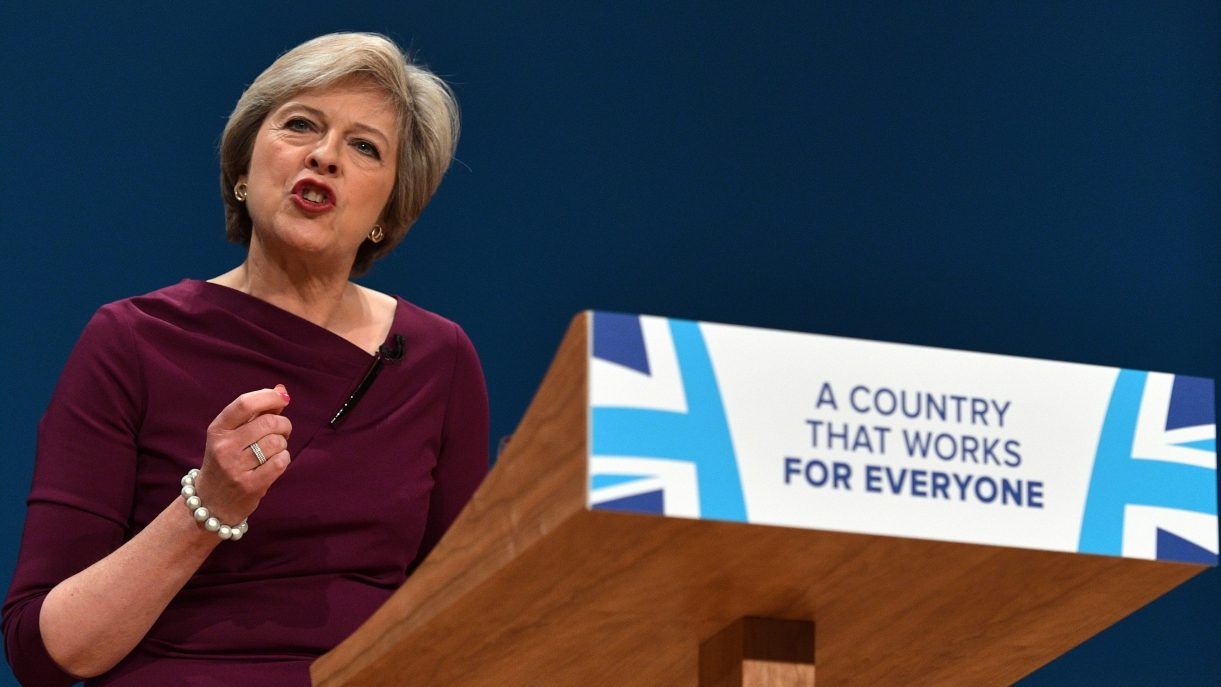

How long can Theresa May stay in power?
Theresa May fought her way back from ignominy to No.10, but after a bashing at the ballots can the Prime Minister make yet another comeback?
- Words: Antonio Wedral
Fifteen years ago, Theresa May found herself in a spot of bother.
Newly appointed as chairman of the Conservative Party, she was determined both to make her mark as the first female occupant of the role, and to begin what she saw as the crucial task of modernisation following the Tories’ second bruising election defeat to New Labour.
Her analysis of the challenges facing a party still coming to terms with the 20th century, let alone the 21st, would prove prescient. But in her perhaps understandable desire to make a splash at her first major outing, a speech to the 2002 Conservative Party Conference, she committed what would, until recently, prove her gravest error.
Standing on the conference stage in Bournemouth, she delivered a stark message to the assembled delegates. “You know what some people call us? The nasty party.” The effect was electric, the speech resonating perhaps more profoundly than any delivered from a Conservative conference podium in the modern era.
Some fellow MPs and thousands of grass roots activists would take years to forgive the sin of speaking the truth, seeing in her brutal assessment both a stick for their opponents to beat them with and an insult to public-spirited volunteers and officials.
Fifteen years ago, Theresa May found herself in a spot of bother
But her warning about the way the Conservatives were viewed by the electorate, and her prescription for altering that perception by opening the parliamentary party up to women, ethnic minorities and the working classes, would in time come to be seen as entirely logical, paving the way for the transformative party reforms introduced under David Cameron.
In the Autumn of 2002, however, May must have despaired of getting elected to the tea roster of the Maidenhead Conservative Association, let alone ever attaining high office. She was vilified; her leader, Iain Duncan Smith, soon distanced himself, the press was beastly and she found herself harangued by activists.
Some might have thrown in the towel. Yet she stuck at it, and by the summer of 2016, her party had taken her advice to modernise so thoroughly that she found herself installed unopposed as prime minister. For 10 heady months she enjoyed opinion poll ratings matched only by Tony Blair in his pomp. It was a staggering turnaround, proof that, unlike American lives – to misquote F. Scott Fitzgerald – there are second acts in British politics.
Fast forward to 2017, and as she works on her speech ahead of another Tory conference next month, this time not in Bournemouth but the somewhat grittier Manchester, and at a time when she again finds herself a pariah, might Theresa May be contemplating another comeback?
She could certainly do with one, for there is no question that she is at a low ebb.
Her cunning plan to call a general election three years early in order to increase her majority ran up against a British public which delights in contrariness. In the aftermath of the shattering defeat which followed, her folly in squandering an utterly benign political landscape by mislaying both her majority and her reputation for solidity might have proved fatal.
The night of June 7 was psychologically shattering for May. She has admitted she wept as her husband, Philip, told her the results of the exit poll, which correctly forecast she was on course to lose not just her majority but, worse, her authority.
At a time when she again finds herself a pariah, might Theresa May be contemplating another comeback?
Yet in the cold light of dawn, it became clear that at that moment no one but she was in a position to form a government. Three months on, and for all that British politics resembles a bizarre cross between The Thick of It and House of Cards, that equation has not changed.
Sure, she didn’t get enough seats to form a majority; but neither did Labour, and as long as there are more MPs who prefer her to squat in Downing Street than allow Jeremy Corbyn to storm the barricades, then she can govern.
Barring an energetic burst from the Grim Reaper, she has the numbers in the House of Commons. Even without their £1 billion bung, the Democratic Unionists were never going to allow a man on intimate terms with the IRA to replace her.
Internally, too, the threat to her position is far less potent than it appeared in the days and weeks after the election, when half the cabinet went on manoeuvres; forget jockeying for position, ministers were all but shoving each other into Becher’s Brook.
Most Tory MPs have now arrived at a place where they cannot see a question to which the answer is either Boris Johnson or David Davis, and no one else in the Cabinet seems to offer the inspirational leadership needed to challenge a sitting prime minister (Amber Rudd has a certain verve, but is hobbled by the sensitivities of having to nurse a now minute majority in her Hastings seat).
The younger set who might have fancied ‘doing a David’ by emulating Cameron in coming up on the outside to snatch victory, see no reason to rush things. It remains the case that anyone who did take over would be saddled with the thankless task of overseeing Brexit. Far better to allow May to stay on at Number Ten to do the heavy lifting for a year or so, until the next generation is ready to take over.
May herself clearly sees the need to hit the restart button. In early July she delivered an almost embarrassing speech, billed as a relaunch, in which she called on opposition politicians to unite forces with the Tories to provide the country with stable government during the Brexit process. The sniggering from both her opponents and a jaded electorate could be heard all the way in Brussels.
May herself clearly sees the need to hit the restart button
But just because there seems little May herself can actively do to improve her position, it does not mean that the tectonic plates are not moving in her favour.
Predictions she would not survive to the summer parliamentary recess proved inaccurate, and every day that May remains in Number Ten makes it more likely that her time as Prime Minister will eventually be measured in years rather than months.
Is she capable of achieving anything more substantial than survival for survival’s sake? At present, it doesn’t seem likely. Lacking a majority, she will find it hard to legislate, and without the authority even to shape her own team she will continue to suffer the indiscipline which accompanies every lame duck premier; a somewhat joyless existence for one who had dreamed of achieving so much.
It is hard to see why she would want to stay on, but, just as in 2002, she won’t walk away. Like the dutiful grammar school girl she once was, May is temperamentally incapable of failing to hand in her homework. She has set herself the task of sorting out the ‘mess’ she got the Tories into at the general election, and she’s going to see it through.
Will she succeed? It’s possible, if doubtful. There might be second acts in British politics, but people are rarely given a third.
Further reading


What Patek Philippe Was in Succession

